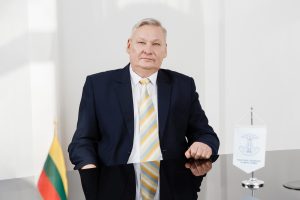The need for innovation is dictated by the market
First, G. Rainys notices that more than 20 percent of gross domestic product (GDP) in Lithuania came from different industries. According to him, remembering the big crisis in 2000 and 2009, this number is a good indicator of the economy’s functioning.
“Of course, I am also glad that after the COVID-19 pandemic-related crisis industry in Lithuania seems to be functioning well. In some cases, it became even stronger because the pandemic essentially forced businesses to exploit e-commerce and digitalization possibilities. Also, recently we presented a roadmap for the circular economy, related to renewable materials. I believe we have a pretty good pace in establishing renewable energy. So, all in all, I think we are going forward”, says Economy Advisor.
Export plays a significant role in the Lithuanian economy. G. Rainys notices that Lithuania is well incorporated in the international production value creation chain, but it still is at the lower stage of international value creation chains. In other words, it mainly produces components rather than final assembling cooperation.
“An example can be given – multinational furniture company “Ikea”. We are one of the largest suppliers of “Ikea” production in the world. However, it’s not enough that we do not make important decisions in this field, but we also must follow certain company rules, starting with forest certification. Again, if “Renault”, “Mercedes-Benz” or other big names will start manufacturing electric cars, that will require certain components. But once they are producing what they are producing, we are simply reflecting that”, says G. Rainys.
Economy Advisor of the Association of Lithuania Chambers of Commerce also adds that innovative activities in the Lithuanian industry are pretty low. The explanation, according to him, is simple. Even though the Lithuanian industry has modern technology, it has very precisely defined orders, of what the industry should produce. G. Rainys emphasizes that this is a competitive market, Lithuania is competing with its neighbors. But again, Lithuania simply needs to reflect on orders given by big companies.
“However, to improve the situation and move forward from the initial stage we should always be looking for European Commission initiatives – clusters, technology platforms, digital innovation apps, and other initiatives, which are very important for industry. Like participation in the programs – “Horizon Europe”, “Battery Alliance”, “Hydrogen” and new initiatives related to the European chip market”, says expert.
European initiatives for solving problems
Speaking about major problems in Lithuania’s business, G. Rainys distinguishes two of them – a mismatch of skills and a shortage of labor force. But in terms of industry, he notices that the main problems are quality of education and preparation for the labor market.
“We are always pointing out German experience – dual learning. All agree that is not enough to learn only in a professional school. Because technology always will be newer and better in industrial enterprises rather than in professional schools. So, basic pieces of knowledge you need to obtain in professional schools but also at the time you need to gain experience in industrial enterprise. And here we still have a gap. We can’t rationally divide time and the money, how much time you need to spend in professional schools and when to go to enterprise”, says Economy Advisor.
Finally, talking about the role of public policy, G. Rainys does not believe that the government of Lithuania could produce super specific, more efficient public policy related to Industry 4.0 developments. He thinks that if Lithuania will follow up on EU news correctly and efficiently, it may be enough.
“I can’t imagine the very modern high-technology industry without not participating efficiently in European programs. There are a lot of programs, also we have a lot of business alliances. So, if we transfer all of that and follow all initiatives correctly, I believe we will create a road map for the Lithuanian industry to move forward over Industry 4.0.”, says Economy Advisor.
The discussion is a part of the “In4Act” project, implemented by the Kaunas University of Technology School of Economics and Business researchers and financed by the European Union project “Horizon 2020”.


